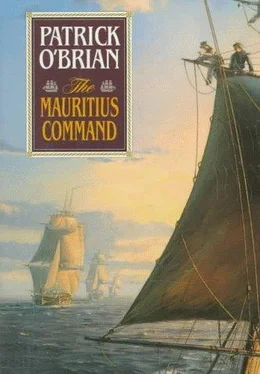Patrick O'Brian - The Mauritius Command
Здесь есть возможность читать онлайн «Patrick O'Brian - The Mauritius Command» весь текст электронной книги совершенно бесплатно (целиком полную версию без сокращений). В некоторых случаях можно слушать аудио, скачать через торрент в формате fb2 и присутствует краткое содержание. Жанр: Книги. Описание произведения, (предисловие) а так же отзывы посетителей доступны на портале библиотеки ЛибКат.
- Название:The Mauritius Command
- Автор:
- Жанр:
- Год:неизвестен
- ISBN:нет данных
- Рейтинг книги:5 / 5. Голосов: 1
-
Избранное:Добавить в избранное
- Отзывы:
-
Ваша оценка:
- 100
- 1
- 2
- 3
- 4
- 5
The Mauritius Command: краткое содержание, описание и аннотация
Предлагаем к чтению аннотацию, описание, краткое содержание или предисловие (зависит от того, что написал сам автор книги «The Mauritius Command»). Если вы не нашли необходимую информацию о книге — напишите в комментариях, мы постараемся отыскать её.
The Mauritius Command — читать онлайн бесплатно полную книгу (весь текст) целиком
Ниже представлен текст книги, разбитый по страницам. Система сохранения места последней прочитанной страницы, позволяет с удобством читать онлайн бесплатно книгу «The Mauritius Command», без необходимости каждый раз заново искать на чём Вы остановились. Поставьте закладку, и сможете в любой момент перейти на страницу, на которой закончили чтение.
Интервал:
Закладка:
Day after day the raids on military installations continued, in spite of the opposition of the French regulars and of the far more numerous militia; for the French had no cavalry, and boats guided by a pilot who knew every creek and passage could reach their goal far sooner than the infantry. Moreover, as Stephen's printed sheets attained a wider circulation, it became apparent that the militia was growing less and less inclined to fight: in fact, after about a week in which the Nereide had traversed the country in all directions, doing no harm to private property, paying for whatever they needed, treating the private Mauritians civilly, and routing all the meagre troops that the southern commander could bring against them, the attitude of the militia came more to resemble a neutrality, and a benevolent neutrality at that. Day after day the soldiers, Marines, and seamen went ashore: the frigate grew steadily more infested with monkeys and parrots, bought in the villages or captured in the woods; and Stephen, though busy with his own warfare, had an interview with an ancient gentlewoman whose grandfather had not only seen, run down and devoured a dodo, perhaps the last dodo to tread the earth, but had stuffed a bolster with its feathers.
Although there was no loot, this was a pleasant Interval for all hands, with plenty of excitement and charming weather to say nothing of fresh fruit, fresh vegetables, fresh meat and soft tack: yet Clonfert exultant was a less agreeable companion than Clonfert oppressed. Stephen found his boisterous energy wearisome, his appetite for destruction distasteful, and his continual dashing about the country, often in full dress with his diamond-hilted sword and his foolish star, as tedious as the dinners he gave to celebrate the sometimes important, sometimes trivial conquests of his little force. They were conquests in which Stephen could detect no coherent plan: to him they seemed no more than a series of raids determined by the whim of the day; though on the other hand their want of logical sequence puzzled the French commander extremely.
These feasts were attended by Clonfert's officers, and once again Stephen noted the curiously vulgar tone of the Nereide's gunroom and midshipmen's berth, the open flattery of the Captain, and the Captain's appetite for this flattery, however gross. Not a dinner passed without Webber, the second lieutenant, comparing Clonfert with Cochrane, to Clonfert's advantage: the word "dashing" was in daily use: and once the purser, with a sideways look at Stephen, offered a comparison with Commodore Aubrey--a comparison that Clonfert, with an affectation of modesty, declined to allow. Stephen also observed that when McAdam was invited, which was not always the case, he was encouraged to drink and then openly derided: it grieved him to see a grey-haired man so used by young fellows who, whatever their seamanship and courage might be--and there was little doubt of either--could make no claim to any intellectual powers nor yet to common good-breeding. And he found it still more painful to see that Clonfert never checked their merriment: the Captain seemed more concerned with gaining the approval- even the worship--of his young men than with protecting an old, diminished friend.
It was in the mornings that Stephen found Clonfert's boisterousness more than usually tiresome: and he particularly regretted his company one forenoon, when, in an interval between political activities, he was negotiating with his old lady for the bolster. Clonfert spoke quite good French and he meant to help, but he hit a false note from the beginning. His noisy facetiousness offended and confused her; she began to show signs of incomprehension and alarm and to repeat that "one never slept so well as upon dodo--sleep was the greatest blessing that God sent to the old--the gentlemen were young, and could do very well on booby-down." Stephen had almost abandoned hope when Clonfert was called away; but once he was out of the room she reconsidered his argument, and he was paying down the price when the door burst open, a voice shouted "Run, run for the boats. The enemy is in sight," and the village was filled with pounding feet. He laid down the last broad piece, caught the bolster to his bosom, and joined the rout.
Far out at sea, to windward, five ships were standing in towards the Ile de la Passe. Steadying himself in the gig, with his spy-glass to his eye, Clonfert read them off. "Victor, the corvette, leading. Then their big frigate, the Minerve. I can't make out the next. Then, by God, the Bellone. I could almost swear the last Is the Windham Indiaman again. Stretch out, stretch out, there; pull strong."
The gig's crew pulled strong, so strong they left the two other boats that had been launched far behind--three more in a farther creek had not yet even gathered their men. But it was a long, long pull, the whole length of the two spreading anchorages between the shore and the island, four miles and more against the wind.
"I shall lure them in," said Clonfert to Stephen. And then, having glanced impatiently back towards the distant boats, he added, "Besides, if they go round to Port-Louis, Sirius and Iphigenia will be no match for them, with Hamelin bringing his three frigates out." Stephen made no reply.
The exhausted crew ran the gig alongside the Nereide. Clonfert told the coxswain to stay there and ran aboard; a few moments later the frigate displayed a French ensign and pendant and Clonfert dropped down into the boat, crying, "The fort, and stretch out for all you are worth."
Now the fort too showed French colours, and after a short pause the French signal ran up the flagstaff on the island: "Enemy cruising north of Port Louis'. The leading frigate replied with the French private signal; the island answered it correctly; and each ship made her number. Clonfert had been right: Victor, Minerve, Bellone; and the two others were Indiamen, outward-bound Indiamen taken in the Mozambique channel, the Ceylon and the unlucky Windham again.
On nearing the reef the French squadron reduced sail; it was clear that they were coming in, but they were coming slowly now, and there would be time to make ready for them. Stephen chose a high, remote corner of the fort from which he could survey the whole scene and sat there on his bolster. Above him the white trade-clouds passed steadily over the pure sky; in the warm sunlight the breeze cooled his cheek; and overhead a bosun-bird wheeled in perfect curves: but within the ramparts below he saw far more confusion than he had expected. Aboard the Nirjide, which had warped in closer to the island and which was now anchored with a spring on her cable, everything seemed to be in order, although so many of her hands were away in the boats; she was clearing for action, her guns were run out already, and her old standing officers had the process well in hand. But in the fort people were running hither and thither; there was a great deal of shouting; and the Indian gunners, whose officer was somewhere in the boats or perhaps on shore, were arguing passionately among themselves. Soldiers and sailors were at cross purposes: and even among the seamen there was none of that quiet, efficient cheerfulness that marked the actions Stephen had seen with Jack Aubrey--no impression of a machine moving smoothly into place. No food was served out, either: a small point, but one that Jack had always insisted upon. And the remaining boats, with at least a hundred and fifty soldiers and seamen in them, were still a great way off: as far as he could make out, the launch had run aground on the horn of a bank, and since the tide was on the ebb the others were having great difficulty hauling it off.
In the fort and on the lagoon time seemed to stagnate, in spite of the strenuous activity: out at sea it flowed steadily, perhaps faster than its natural pace, and Stephen felt a large, ill-defined apprehension fill the back of his mind, like that which accompanies a nightmare. Now men could be distinguished aboard the ships: now their faces were becoming visible, and orders came clear upon the wind. The French ships had formed a line to enter the channel, the Victor first, then the Minerve, then the Ceylon. The corvette steadied, hauled up her courses, and led in under topsails alone, the lead going in the chains on either side. The noise in the fort had given place to dead silence, with the smell of slow-match wafting on the breeze, drifting from the spare tubs and those beside each gun. The corvette entered the narrows, glided nearer and nearer, her bell flashing in the sun; came abreast of the fort, where the turbanned gunners crouched behind the parapet, and passed it, still in this dead silence. Her master's order to the helmsman brought her round in a tight curve behind the fort, into the deep water, and within twenty yards of the Nereide. The Nereide's French ensign came down, the English colours ran up with a cheer, and her side vanished in a great cloud of smoke as her broadside roared out in a single vast prolonged explosion. Another and another, with incessant cheering: the corvette dropped her anchor under the Nereide's starboard quarter, still under her full traversing fire, and an officer ran aft along her shattered deck, calling out that she had struck.
Читать дальшеИнтервал:
Закладка:
Похожие книги на «The Mauritius Command»
Представляем Вашему вниманию похожие книги на «The Mauritius Command» списком для выбора. Мы отобрали схожую по названию и смыслу литературу в надежде предоставить читателям больше вариантов отыскать новые, интересные, ещё непрочитанные произведения.
Обсуждение, отзывы о книге «The Mauritius Command» и просто собственные мнения читателей. Оставьте ваши комментарии, напишите, что Вы думаете о произведении, его смысле или главных героях. Укажите что конкретно понравилось, а что нет, и почему Вы так считаете.












